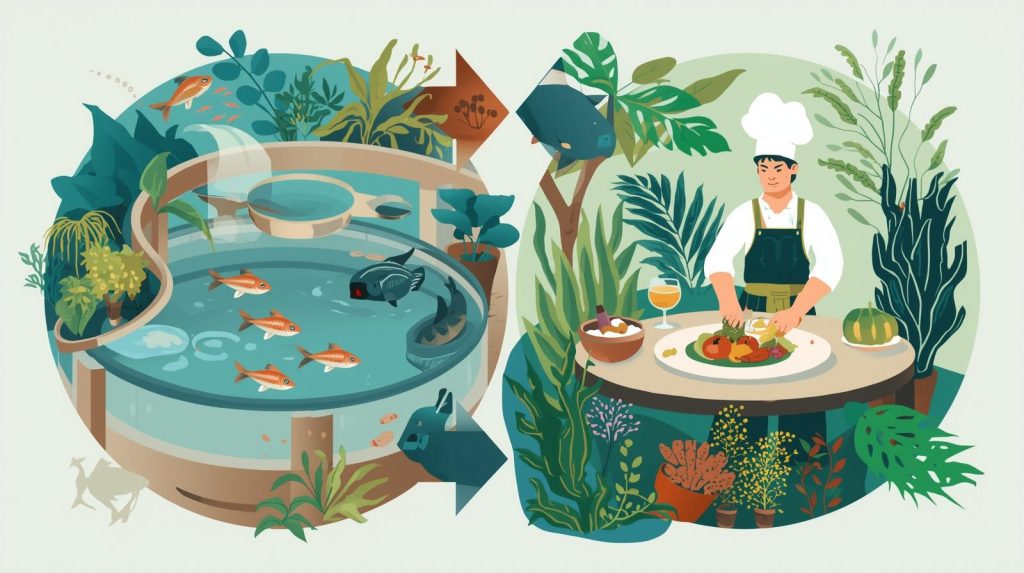Responding to a New Food Consciousness
The world is undergoing a profound transformation in its relationship with food. More than ever, consumers are seeking options that are not only nutritious but also ethically and sustainably produced. This demand for healthier, more conscious, and responsible food is redefining the global food industry. In this new paradigm, it is no longer enough to produce in quantity; quality, transparency, and respect for the planet are now fundamental pillars.
For decades, oceans have been a primary source of protein, but capture fisheries have reached their ecological limits. Simultaneously, aquaculture—the farming of aquatic organisms—has emerged as a vital solution to meet this growing demand for high-quality seafood. However, its rapid growth has sparked a necessary debate about its impact.
Today, the industry stands at a crossroads, and the answer to this new challenge is Circular Aquaculture. This model goes beyond conventional production to create a regenerative system inspired by nature’s cycles. The motto “from nature to table, and from table to nature” encapsulates its essence: a closed loop where waste becomes a resource, environmental impact is minimized, and social and economic value is maximized. European projects like CIRCU-TECH are at the forefront of this revolution, demonstrating that it is possible to offer high-quality, accessible, and nutritious food in perfect harmony with the expectations of a responsible consumer and the environment.
The New Food Paradigm and the Strategic Role of Aquaculture
The Food and Agriculture Organization of the United Nations (FAO) has identified aquaculture as the fastest-growing food production sector [1]. Its expansion is not merely a response to a need for quantity but to a qualitative shift in global demand: consumers actively seek healthy proteins, produced sustainably and with guaranteed origin.
Contribution to Food Sovereignty and Quality
Food sovereignty is the right of peoples to nutritious and culturally appropriate food, accessible and produced sustainably. Modern aquaculture is a pillar for this right in the 21st century:
1 Local and Trusted Production: Aquaculture enables controlled food production close to consumption centers. This reduces reliance on imports, strengthens local economies, and decreases the carbon footprint of transportation, meeting consumer demand for local products.
2 Access to High-Quality Proteins: Fish and seafood are key to a healthy diet due to their contribution of lean protein, omega-3 fatty acids, and vitamins. The efficiency of aquaculture allows these proteins to be offered at an affordable cost, making a healthy and balanced diet accessible to more people.
3 Traceability and Food Safety: In a controlled farming system, every stage of the product, from egg to plate, can be traced. This complete traceability offers a guarantee of safety and quality that modern consumers demand. Producers control feed, water quality, and animal health, complying with stringent EU regulations.
4 Reduced Pressure on Marine Ecosystems: By providing a reliable source of seafood, well-managed aquaculture meets market demand without compromising the health of oceans, allowing marine ecosystems to recover.
Aquaculture is no longer a mere alternative but a strategic sector for building a global food system that is healthy, sustainable, and fair.
Towards a Blue and Circular Future
The journey “from nature to table” has defined the history of our food. Today, the challenge is to complete the cycle and ensure that the path “from table to nature” is regenerative. Circular Aquaculture represents the materialization of this ideal. It is no longer a futuristic vision but an intelligent response to the demands of the present. We have seen how European aquaculture has evolved to offer products of the highest quality, satisfying an increasingly informed and demanding consumer. It is a pillar for a food system that values health, food sovereignty, and traceability.
The next step is the widespread adoption of circular principles. This model transforms the industry’s mindset, turning waste into resources and minimizing the environmental footprint. However, this transformation requires a highly skilled workforce. This is where projects like CIRCU-TECH play a crucial role. By developing a comprehensive, practical training program enriched with tools like Virtual Reality, CIRCU-TECH is building the human foundations for the aquaculture of the future. It not only transmits knowledge but also inspires a new culture of sustainability.
The future of our food will undoubtedly be bluer. And to meet the expectations of a responsible society, that future must also be circular. With collaboration between academia, industry, and the support of visionary initiatives like the Erasmus+ program, we are equipping a new generation of professionals to lead this transition, ensuring that we can continue to enjoy the bounty of the sea while caring for the planet. The cycle is completed, and in its closure, we find the promise of a prosperous and healthy future for all.
References
[1] Food and Agriculture Organization of the United Nations (FAO). (n.d.). The State of World Fisheries and Aquaculture (SOFIA). Retrieved from fao.org/fishery/sofia/en
